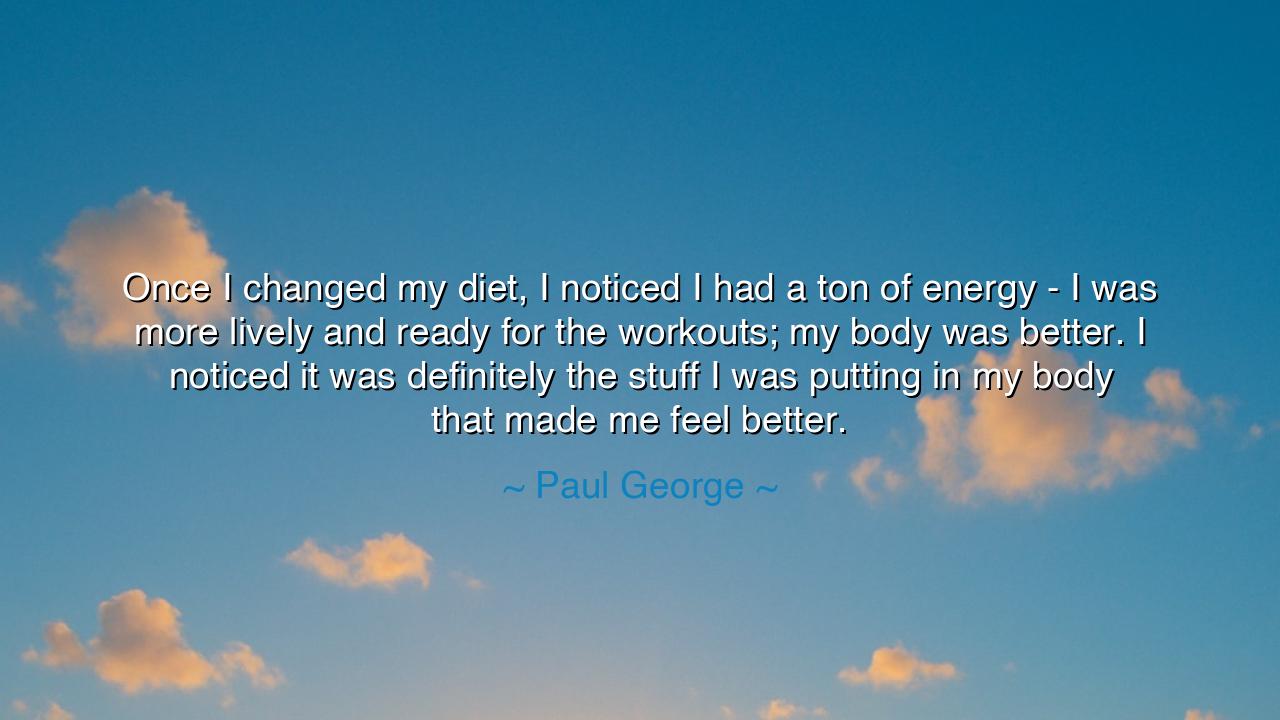
Once I changed my diet, I noticed I had a ton of energy - I was
Once I changed my diet, I noticed I had a ton of energy - I was more lively and ready for the workouts; my body was better. I noticed it was definitely the stuff I was putting in my body that made me feel better.






When Paul George declared, “Once I changed my diet, I noticed I had a ton of energy — I was more lively and ready for the workouts; my body was better. I noticed it was definitely the stuff I was putting in my body that made me feel better,” he was not merely describing the transformation of an athlete — he was speaking of the timeless bond between discipline and vitality, between nourishment and power. His words reveal an eternal truth known since the dawn of civilization: that what one feeds the body is what one feeds the spirit, and that strength is not born from will alone, but from the harmony between what enters and what emerges from the human vessel.
The ancients understood this sacred relationship between food, energy, and purpose. The philosopher Hippocrates, father of medicine, taught, “Let food be thy medicine, and medicine be thy food.” He knew that the body, when nourished with pure and living foods, becomes the temple of vitality — sharp of mind, swift of movement, and bright of soul. Paul George’s realization mirrors this ancient wisdom. Through his change of diet, he did not merely alter what was on his plate — he transformed the rhythm of his life. He discovered that energy, that invisible fire of performance and joy, does not arise by accident, but is cultivated through conscious choice.
His reflection carries more than physical meaning — it speaks of awareness. When he says, “It was definitely the stuff I was putting in my body that made me feel better,” he awakens us to a deeper truth: that most people live unaware of the quiet poison they feed themselves daily, whether in food, thought, or habit. The body, like the earth, responds to what it is given — nurture it, and it flourishes; neglect it, and it decays. George’s experience is a reminder that the body is a faithful servant to the mind, and when the mind chooses clarity, the body rewards it with strength.
Consider the ancient athletes of Olympia, who trained not only with their bodies but with their minds and meals. They lived by strict regimens, avoiding indulgence and consuming what kept them light, quick, and enduring. To them, food was not indulgence but fuel, not pleasure but preparation. Their victory in the arena began not on the field, but in the choices made each morning at the table. Paul George stands as their modern heir — a warrior of the present age who discovered that discipline in diet is the foundation upon which greatness is built. His words remind us that even in our time of abundance, the path to excellence still demands restraint, awareness, and reverence for the vessel that carries our purpose.
And yet, his transformation is not only physical; it is spiritual. For when the body feels renewed, so too does the mind awaken. To be “more lively and ready” is not simply to perform better in sport — it is to live more fully, to greet each day with alertness and gratitude. The ancients called this state eudaimonia — the flourishing of the self when one lives in harmony with nature and with purpose. When Paul George changed his diet, he stepped into alignment with that natural rhythm. The dullness that once clouded his body lifted; in its place came lightness, focus, and joy.
There is, too, a message of responsibility in his words. For in saying, “It was the stuff I was putting in my body,” he accepts full ownership of his condition. He does not blame circumstance or fatigue; he recognizes the profound truth that we are the architects of our own health. This humility — this acknowledgment that vitality is earned, not given — is what separates the wise from the careless. The same principle the ancients applied to virtue applies to nourishment: every choice, repeated daily, shapes one’s destiny. A single meal may seem trivial, but it is the sum of those choices that builds or destroys one’s strength.
Let this, then, be the lesson: honor the body as the sacred temple of your life. Feed it not with excess or convenience, but with intention. Choose foods that give life rather than drain it; eat to empower, not to escape. Let every meal be an act of reverence — for yourself, for the earth that provides, and for the purpose you serve. And remember, as Paul George discovered, that energy is not a mystery. It is the harvest of discipline, the reward of awareness, and the reflection of the respect you give to yourself.
Thus, live as the ancients lived: with gratitude for the harvest, with mindfulness for the meal, and with understanding that strength begins within. For in the end, as George’s awakening teaches us, the body thrives on what the spirit chooses. Feed both with wisdom, and you will not only move through life with vigor — you will live it with brilliance.






AAdministratorAdministrator
Welcome, honored guests. Please leave a comment, we will respond soon